A Women Farmers’ Cooperative on a Mission to Decrease Hunger
In Nigeria, one woman is leading her community to use sustainable farming methods, as well as technology, to thrive. A group of women farmers in Nigeria play a pivotal role…
Read MoreAmerican universities have a rich history of working with the U.S. Government to forge innovative solutions to global hunger. Since 1978, the U.S. Government has supported research programs led by some of the United States’ most prestigious academic institutions in order to help achieve sustained growth in agriculture and reduction in poverty. These programs have also provided long-term degree training in food security-related fields to more than 4,200 students from 130 countries.
Today, under the Feed the Future initiative, these research, education and training programs take place through 24 Feed the Future Innovation Labs, which pair American ingenuity and expertise with some of the best and brightest minds across the globe. A unique network supported by more than 60 top U.S. colleges and universities along with many partner country research and educational institutions, the Feed the Future Innovation Labs are on the cutting edge of efforts to develop and disseminate agricultural technologies and management practices that can help feed a growing global population in the face of a changing climate.
Learn more about the Feed the Future Innovation Labs, or read on to meet some of the talented degree students and researchers who are working with U.S. universities to sustainably build a more food-secure future.
Feed the Future Innovation Lab for Climate Resilient Chickpea: Led by the University of California, Davis

Photo by Karin Higgins.
In a relatively short time, Dr. Bullo Mamo (left) has made huge strides from his early childhood and education in rural Ethiopia to his current position as post-doctoral scholar in plant pathology at the University of California, Davis. Dr. Douglas Cook (right), who directs the Feed the Future Innovation Lab for Climate Resilient Chickpea, helped Mamo get his foot in the door and build a career in research that will allow him to bring his expertise back to Ethiopia.
“My work, and that of the Climate Resilient Chickpea Innovation Lab, aims to develop climate resilient chickpea cultivars that can survive and thrive under low-moisture stress conditions in Ethiopia, Turkey, India, Canada and Australia,” Mamo says. “Ethiopia is the major chickpea producer in Africa and chickpea is economically and culturally significant in Ethiopia. The research outputs will impact the lives of small-scale farmers in my home country of Ethiopia and beyond.”
The Chickpea Innovation Lab is also supporting the graduate degree programs of five mid-career professionalsin Ethiopia to position them to become Ethiopia’s next plant breeding leaders.
Feed the Future Innovation Lab for Peanut Production and Mycotoxin Control: Led by the University of Georgia
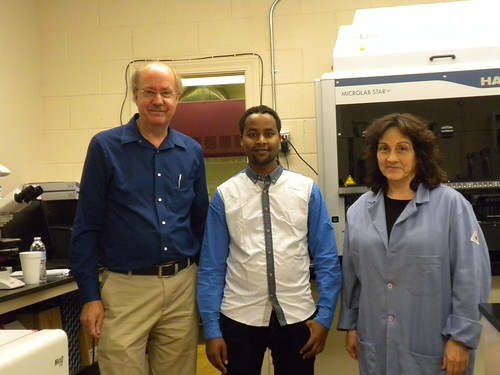
Photo by Renee Arias.
Abdi Mohammed Hassen (center) is a short-term trainee from Ethiopia who worked with Peanut and Mycotoxin Innovation Lab scientist Renee Arias (right) at the U.S. Department of Agriculture National Peanut Research Laboratory in Dawson, Georgia from August through October of 2014. Dr. Dave Hoisington (left) is the Peanut and Mycotoxin Innovation Lab Director.
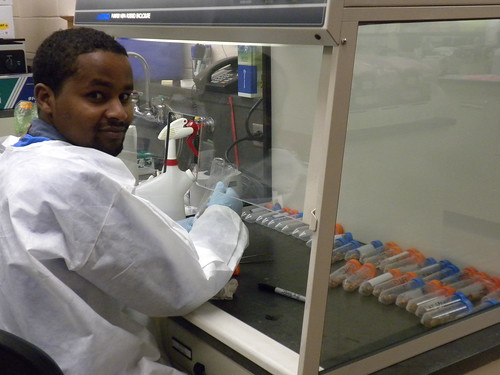
Hassen uses peanut samples he brought from Ethiopia to isolate Aspergillus species. Photo by Renee Arias.
Hassen has since returned home to complete his PhD in plant pathology at Haramaya University in Ethiopia. He is studying the management of aflatoxin in peanuts. Aflatoxins are naturally occurring toxins produced by the Aspergillus species of mold, which can cause serious liver damage and cancer in humans.
While working with Dr. Arias, Abdi learned about Aspergillus species diversity and appropriate methodology for aflatoxin extractions, clean-up and detection by ultra-performance liquid chromatography – a faster, more sensitive technique to detect and quantify aflatoxins, eliminating the need for very large sample sizes.
Feed the Future Innovation Lab for Horticulture: Led by the University of California, Davis

Photo by Stephen Ssemakula, Horticulture Innovation Lab.
Carrie Teiken (left), a University of California, Davis graduate student, examines a citrus tree for disease along with volunteers and farmers in Uganda, while working together on a Trellis Fund project for the Horticulture Innovation Lab. The Trellis Fund pairs small, in-country organizations with U.S. graduate students for the duration of a short-term horticultural project, furthering students’ field experience while enabling them to use their expertise to build the capacity of their partner organization.
Teiken is pursuing a PhD in plant pathology, with research focused on citrus huanglongbing, a serious disease of citrus plants.

Photo by Brenda Dawson, Horticulture Innovation Lab.
In Kenya, these Eldoret University students collected data on different aspects of a field trial with leafy African indigenous vegetables as part of a Horticulture Innovation Lab product and market-chain development project led by Purdue University.
The students’ research corresponded with their respective areas of study. Letting Fanuel (left) evaluated aspects of seed quality as part of his seed science and technology degree; Emmanuel Owino Ayua (second from left) studied best postharvest practices with the harvested vegetable leaves; Silvia Ajaa Omasaja (second from right) examined the plants’ pests and diseases; and Benson Migwi (right) focused on agronomic practices as part of his soil science expertise.
In the last five years, more than 117 university students have participated in Horticulture Innovation Lab research projects.
Feed the Future Innovation Lab for Adapting Livestock Systems to Climate Change: Led by Colorado State University
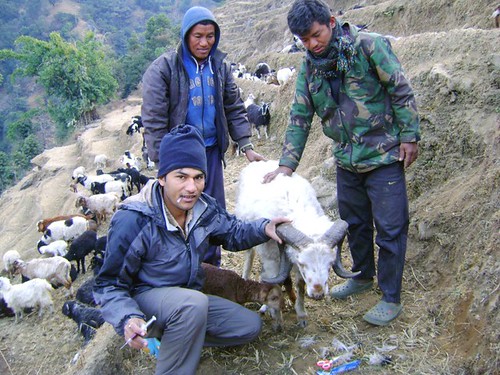
Drawing blood from sheep for research on Blue Tongue Virus. Photo by Tara Naith Gaire.
Tara Nath Gaire’s transition from a livestock keeper with his grandfather to a public health veterinarian with the Nepal Directorate of Animal Health was made possible through financial support from the Livestock-Climate Change Innovation Lab. Selected for the Lab’s Nepal Scholars’ program in 2011, Dr. Gaire has used his funding to pioneer a “One Health” approach to zoonotic disease (diseases that can transmitted between animals and humans) in Nepal during his studies at Nepal’s Institute of Agricultural Science.
Focusing on the interactions of farmers, livestock and their environment, Gaire’s research explores the impact of climate change on vector-borne zoonotic disease to prepare farmers for the increased risk of disease due to environmental changes.
Feed the Future Innovation Lab for Climate Resilient Cowpea: Led by the University of California, Riverside
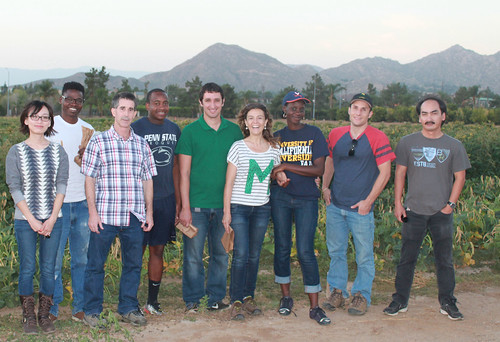
Photo by Kiera Lucas.
In training the next generation of scientists in agriculture and food security, the Feed the Future Innovation Labs benefit not only the developing countries where they work, but also U.S. agriculture. Many of the advances in scientific fields that study food crops and animals have had far-reaching impacts on farmers around the globe, including American farming families.
Pictured above are international and American beneficiaries of the Cowpea Innovation Lab standing in front of a UC Riverside cowpea field. From left to right: Yi-Ning Guo (Innovation Lab Assistant), Arsenio Ndeve (PhD student in plant pathology from Mozambique), Timothy Close (Cowpea Innovation Lab Director), Patrick Thomas (American PhD student in plant biology), Janssen Santos (Post-Doctoral student from Brazil), Maria Munoz-Amatriain (Project Scientist from Spain), Sassoum Lo (MSc student in plant biology from Senegal), Mitchell Lucas (American PhD student in genetics, genomics and bioinformatics), and Bao-Lam Huynh (Project Scientist from Vietnam).
Feed the Future Innovation Lab for Integrated Pest Management: Led by the Virginia Polytechnic Institute and State University
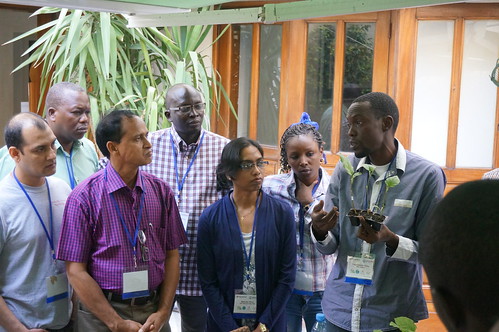
Photo by IPM Innovation Lab.
Pictured above are participants at the May 2014 Feed the Future Innovation Lab for Integrated Pest Management workshop on “Invasive species identification and management in the tropics” in Dakar, Senegal. Participants learned how to identify plant diseases and how to graft plants. The workshop drew university students and scientists from Bangladesh, Burundi, the Congo, Ecuador, Guatemala, Kenya, Nepal, Tanzania and Uganda, as well as from Senegal. Learn more about how the Integrated Pest Management Lab is fighting invasive crop pests.
Feed the Future Innovation Lab for Nutrition: Led by Tufts University
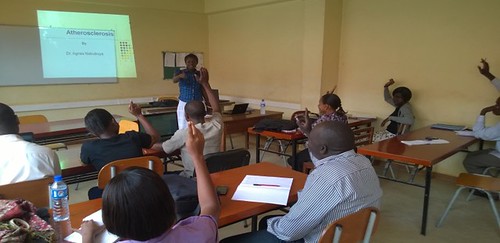
Photo by Nutrition Innovation Lab.
The Nutrition Innovation Lab in Africa supported Dr. Agnes Nabubuy (standing), assistant lecturer in the Department of Food Technology and Nutrition at Makerere University in Uganda, in order to enhance her nutrition knowledge and teaching skills. She took four courses at the Harvard University School of Public Health’s 2014 summer program in Boston.
Dr. Nabubuy learned how utilizing student presentations is a valuable method of material delivery and she practiced evidence-based teaching (using published articles) to show the latest discoveries about particular topics. She received ten course credits and says, “[The training] strengthened my knowledge of the latest research on linking nutrition to global health indicators.”
In Nigeria, one woman is leading her community to use sustainable farming methods, as well as technology, to thrive. A group of women farmers in Nigeria play a pivotal role…
Read MorePhoto Credit: West Africa Trade and Investment Hub February 24 marks the grim second anniversary of Russia’s invasion of Ukraine. The invasion not only brought suffering to millions of Ukrainians,…
Read MoreSource: USAID On this year’s International Day of Women and Girls in Science, learn about the contributions and challenges these researchers face Every year, International Day of Women and Girls…
Read MoreWomen have always worked in agrifood systems, but these systems have not always worked for women. That’s because barriers have stood in their way, preventing them from making their fullest contributions. Last year, the UN Food and Agriculture Organization’s (FAO) “Status of Women in Agrifood Systems” report showed us just how slow progress has been in closing the gender gap in agriculture over the past decade. Their access to irrigation, livestock, land ownership and extension services has barely budged over the past decade. Also, they are facing these challenges at a time of immense global shocks.
Read More